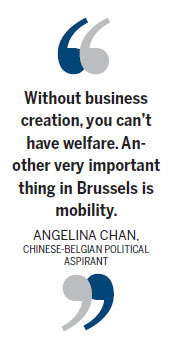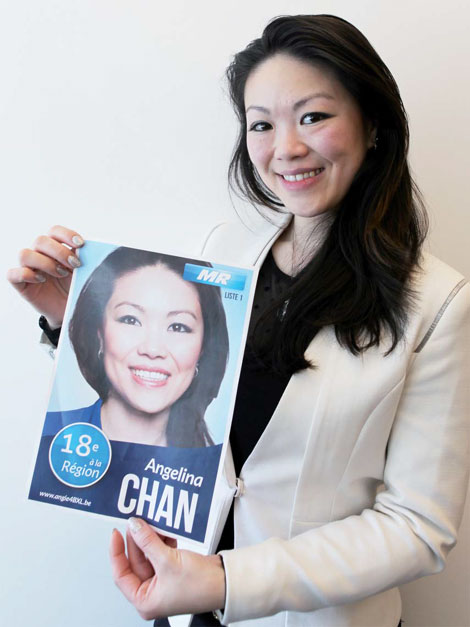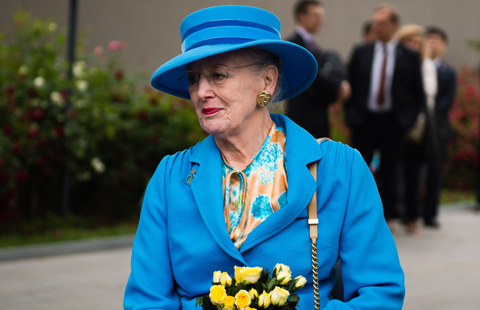Candidate hopes for third time lucky
Updated: 2014-05-09 08:09
By Fu Jing (China Daily Europe)
|
|||||||||||
|
Chan says she is proud that one of her ideas, to have special parking places for the disabled at big-event venues, has been adopted. Provided to China Daily |
Chinese-Belgian local councillor has eyes set on higher things
Angelina Chan, a young Chinese-Belgian political aspirant, will soon enter the home stretch in another effort to win a seat in the parliament of the Brussels-Capital Region, one of the country's four regional parliaments.
As the election looms on May 25, Chan says that if she is to attract voters, it is crucial that they know who she is.
The first thing she does is unfurl a poster featuring her picture, one of dozens of photos of candidates that have sprung up in shops, cafes, restaurants, and in public spaces in Schaerbeek, one of the 19 municipalities in the region, and other places in Brussels.
Four years ago, six weeks before the last elections, a Belgian newspaper, playing the beauty and celebrity cards to the hilt, said of her in a headline, "La plus jolie, c'est Angelina" ("Angelina is the prettiest of them all").
"My very first step is to do visional work so voters can get to know me better and support me, though my chances of winning are still only 50-50," says Chan, 35, who is standing for the Reformist Movement, which advocates free markets.
In Belgian politics, candidates' chances of being elected rely greatly on their place on parties' candidate lists. Chan failed to get elected in 2004 and 2009, and in the first of those was No 52 on her party's list, she says. This year she is No 18 on a list of more than 80 candidates. In the elections five years ago, Reformist Movement candidates won 24 seats in the Brussels-Capital Regional Parliament.
This year's elections are being held the same day as federal elections and elections for the European Parliament.
Belgian politics is characterized by strong regional and linguistic divides.
"I got to where I am today step by step," says Chan, whose Mandarin has strong overtones of the French she speaks in everyday life.
Pointing at the picture of herself in the poster, she says her looking into the distance illustrates her election slogan, which is "Aiming higher, further and towards tomorrow".
For voters the message is that "I want to do go further with you", she says.
Chan was born in Belgium in 1978, grandparents on each side of her family having migrated to Belgium and the Netherlands in the 1960s. Later her parents moved to Belgium, where they met and married, and opened a restaurant. Her father, from Shanghai, still runs the family business, and many of the customers' links with the restaurant stretch back more than 40 years, she says.
Chan dates her interest in politics to when she was a child. Because of her parents' heavy commitments with the restaurant, a neighbor who happened to be interested in politics took care of her because Chan and their daughter were the same age.
"Everyday we sat around the table, eating and listening to discussions between the parents after school. It was probably my earliest encounter with politics."
While many Chinese live in Belgium, they have been conspicuously absent on the political stage. Chan's political mentor, Jacques Simonet, former mayor of Anderlecht, who died at the age of 43 in 2007, persuaded her to join the political fray.
Chan, who serves as youth chair of the Reformist Movement in Schaerbeek, says Simonet told her that her Chinese and Belgian background would make her stand out in politics.
"He was right, and I believe two factors have contributed to my success."

One is her respect for others, especially her elders, she says.
"This is really something I learned from Chinese culture, and it has helped me a lot."
The other is her being a team player, something she learned in her education, she says.
People wanting to enter politics need to be willing to sacrifice themselves for the public good, she says.
In addition to standing in parliamentary elections, Chan has been a councilor of Schaerbeek municipality since 2006 and was re-elected in 2012.
"In local elections you get very close to the public. You get to talk to them on the street, and to know what's going on in their neighborhoods and in their lives. You can talk to them about problems and find solutions."
Her work as a councilor in Schaerbeek is part-time. The municipality consists of 47 councilors, with a mayor, 10 vice-mayors, a ruling majority and the opposition. In the first six-year term, she was part of the majority; now she is in opposition.
Chan says she is proud that one of her ideas, to have special parking places for the disabled at big-event venues, has been adopted.
Eight years ago Schaerbeek was alone among municipalities in Brussels in charging motorists street parking fees in certain areas from the minute they parked. The others allowed free parking for 15 minutes. Chan urged Schaerbeek to follow suit.
"At first the municipality rejected the idea, but later had a change of heart. In fact, in Schaerbeek drivers can now park for 20 minutes without having to pay."
Apart from her work as a councilor, Chan, who studied labor science and computer programming, runs a business as a consultant in human resources after having worked as a consultant for the Belgian energy company Electrabel, and for the multinationals GlaxoSmithKline and Microsoft.
"I now need to put all my energy and time into the election campaign," she says.
Belgium's social model pays great attention to looking after people, something she lauds, but taxes, particularly on lower-people, are onerous and should be reduced, she says.
On average half of what a Belgian earns goes in taxes, she says. She proposes that the government exempt employers from making social contributions for their first three employees to promote job and business creation.
"Without business creation, you can't have welfare. Another important thing in Brussels is mobility."
The availability of street parking is rapidly shrinking because of the need for footpaths, she says. At the same time there is a plan to get rid of 45,000 parking spots in the Brussels region in the next few years, which is "just crazy".
"In come cases, you cannot do without a car. Because footpaths are proliferating, there are fewer parking spots. This is not an idea that I am running on alone; my party supports it."
In some places in Europe, including Brussels, trading laws restrict shops opening to six days a week, and Chan says this law needs to be abolished.
"The reality is that Belgium needs to do what it can to create jobs and boost growth."
Li Xiaofei contributed to this story.
fujing@chinadaily.com.cn
(China Daily European Weekly 05/09/2014 page28)
Today's Top News
US museum to return statue to Cambodia
Stronger protection eyed for overseas Chinese
China CPI up 1.8% in April
Thai PM faces ban from politics
Letter asks for leniency in poisoning case
Suspect killed in Xinjiang attack
Chinese premier arrives in Angola for visit
Property tracking system launched
Hot Topics
Lunar probe , China growth forecasts, Emission rules get tougher, China seen through 'colored lens', International board,
Editor's Picks

|

|

|

|

|

|






